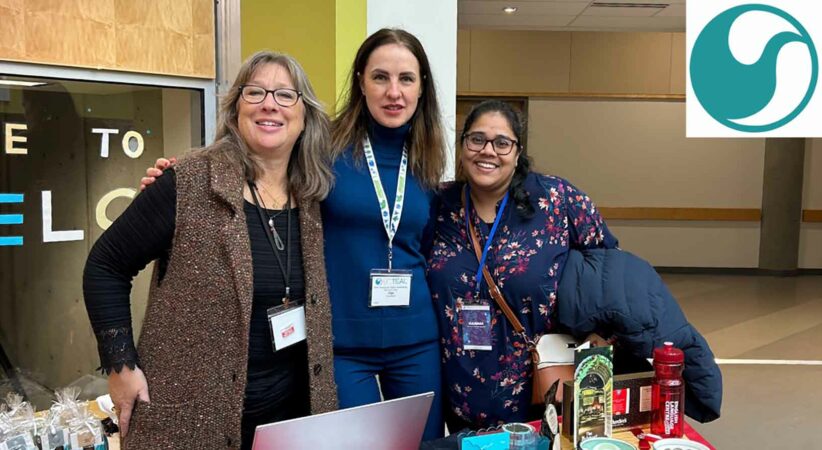
Bridging Literacy Gaps
The Role of BC TEAL in Supporting EAL Educators and Learners
Guest post by Cindi Jones – Executive Director, BC TEAL
British Columbia Teachers of English as an Additional Language (BC TEAL), founded in 1967, serves educators committed to advancing the field of teaching English to non-native speakers. Many learners in our community face literacy challenges upon arriving in Canada.
The role of BC TEAL is to help provide support for teachers working with EAL students who have literacy challenges.
Learner challenges
Adult EAL (English as an Additional Language) learners in BC need specialized training to develop their language and literacy skills in English, which is essential for achieving their personal goals. Unfortunately, about 60% of new immigrants face additional challenges due to low literacy levels, adversely affecting their ability to secure and maintain employment. EAL learners who have achieved fluency and accuracy in spoken English may find literacy challenges even more pronounced than those with lower oral proficiency (Source: Greater Victoria Alliance for Literacy).
60% of new immigrants face additional challenges due to low literacy levels.
Assessment
Upon arrival in Canada, EAL students are assessed and assigned a Canadian Language Benchmark (CLB) level for their English skills. Ideally, this assessment should also assign, if needed, a Literacy (L) designation that accompanies the CLB level, reflecting the individual’s reading and writing skills (Source: AMSSA). However, in practice, the literacy designation is often either not provided or not adequately maintained as the student advances through LINC (Language Instruction for Newcomers to Canada) language proficiency levels. This inconsistency can negatively affect the learner’s educational journey and hinder their progress in gaining meaningful employment and furthering their education placing an additional burden on the instructors.
Teacher shortage
BC faces a shortage of EAL instructors with strong literacy teaching skills, as well as insufficient literacy training for those teaching EAL. LINC providers recognize the challenges of EAL literacy learners and when numbers permit, learners will be placed in specialized literacy classes. However, this is often not possible in smaller centers and remote areas, making it difficult for service providers to support students with literacy needs. Despite these constraints, organizations are resourceful in utilizing the resources they have. Centres may assign a seasoned instructor with strong literacy skills to play a more active role in teaching literacy-specific skills or to mentor less experienced teachers. Additionally, some centers rely on volunteer tutors to handle specific tasks under the guidance of instructors. Nevertheless, the primary responsibility for addressing these educational needs typically falls on the classroom teachers.
Professional development
The role of BC TEAL is to help provide support for teachers working with EAL students who have literacy challenges. A highlight is the Literacy Community of Practice, where educators regularly meet to share methods, tackle common challenges, and foster professional growth. Non-members are invited to join three meetings before becoming joining BC TEAL. Further details and an informative webinar about our communities of practice are available: BC TEAL Communities of Practice.
Moreover, BC TEAL organizes various professional development events, accessible both online and in-person, which span topics from teaching adults with learning disabilities to integrating AI in educational settings. In addition, our site hosts a range of open-access resources, which highlight the ongoing need for literacy materials, accessible via our website: BC TEAL Resources. While you are on the site, take a look at the BC TEAL Journal. This is a peer reviewed resource that offers research-based articles to provide a solid foundation for your teaching practice and references for grant applications. Our teams are always looking for contributions from literacy professionals.
Grants
The Teal Charitable Foundation, our philanthropic branch, offers multiple grants each autumn for educators. There are four awards to cover conference expenses. The amounts range from $1000 to $3000. There are also three awards that intended to fund the creation of resources and other projects. These awards range from $2500 to $5000. Details on each award are available on the foundation’s website: TEAL Charitable Foundation
Share your skills
As the number of literacy students in EAL classes increases, BC TEAL is constantly looking for recommendations and resources to meet this growing need. As a professional, you have skills to share. We encourage you to contribute a blog post, newsletter, or journal article, join a community of practice, suggest a speaker for a webinar or collaborate with your peers to deliver a session. The opportunities to contribute to your profession are plentiful and welcome.
References
- AMSSA, Migration Literacy; Newcomer Literacy, 2017
- Greater Victoria Alliance for Literacy, Literacy Data, 2021.
- Penner, T.L, Abbot, M.L., Kent, K.L., Scaffolding Self-Regulated Learning for English as an Additional Language Literacy Learners, BC TEAL Journal, Volume 7 Number 1 (2022): 85–97
Related Blog Posts
Back to Basics: Write Alouds
Welcome to our Back to Basics series! This week we are discussing a strategy called write alouds.
Literacy Connects Us to Health
Read how health literacy keeps us connected to our bodies, daily lives and long-term health.
Decoda’s Holiday Reading
Decoda staff share which books they will be reading over the holiday break.
